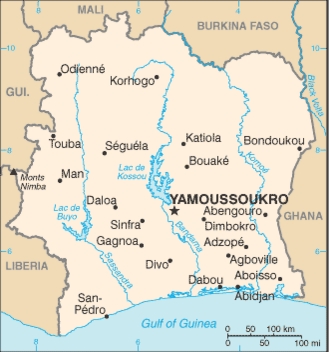ABIDJAN, Ivory Coast -- Not long ago, the thought of President Laurent Gbagbo and rebel New Forces leader Guillaume Soro serving in the same government seemed absurd. In 2002, Soro's rebels attempted to overthrow Gbagbo's regime, which they called discriminatory because it viewed northerners, including those who served in the army, as non-Ivorians. A civil war then erupted in what was once West Africa's most stable and prosperous country. Gbagbo deployed military force to crush the rebels -- his loyalists sneered they were armed bandits controlled by France -- who seized Bouake, the country's second-largest city. When the fighting subsided, the government remained in charge of the south, and the New Forces grabbed control of the north. A buffer zone or "zone of confidence," patrolled by United Nations peacekeepers and French troops, separated the two belligerents.
Ivory Coast Anticipates Elections in Fragile State of Peace

